The 10 Greatest War Films of All Time (So Far)
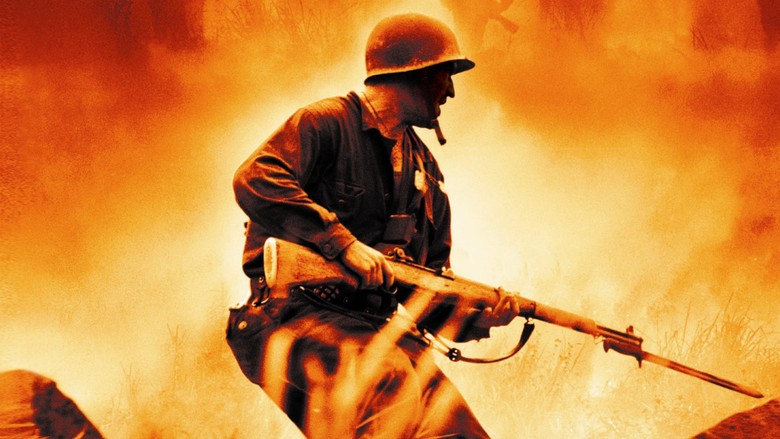
This article will discuss the ten greatest war films of all time, based on the criterion of warfare itself and the brutality therein. Because of this, films such as Zero Dark Thirty (2012), Schindler’s List (1993), Inglourious Basterds (2009), and The Pianist (2002) will not be mentioned because their narratives center around war, not within it. All war films featured here deal with soldiers’ both internal and external antagonism surrounding the conceptuality and problem not only of war, but violence itself.
Cinema above all other mediums of art has the capability to capture this brutality and viciously mutilated humanity more than any other. Many of these war films feature prominent sound design, sound mixing, cinematography, outrageous special effects, along with sets, crews, and locations of a grandiose caliber to put the audience “in the battle”. There are many disputes about whether cinema doing this effectively deems war as horrible, or glorifies it. Many believe that no matter how intense a war film can be, since it is in fact a film–and the audience knowing this–it will never be “real”, but a fallacy of something that most people cannot even being to comprehend.
All war films mentioned here will be noted for their ability to make a profound statement on, most commonly, the ideology and political unrest behind the conflict of the war itself. The war genre is also the kingpin of what can be seen in the scope of cinematography. The war genre is full of grit, high shutter speeds, flashing lights, dirt, blood, bullets, guns, fires, explosions, and jaw-dropping locations. Nevertheless, war films should not merely try to show the voyeur of war alone, but to communicate some kind of didactic statement on the humanity, or lack thereof, within it.
10. Platoon (1986)
When Oliver Stone, a known controversial filmmaker who often tackles American ideology and culture, makes a war film about arguably the most controversial American war in history, the Vietnam War, it’s going to be very memorable.
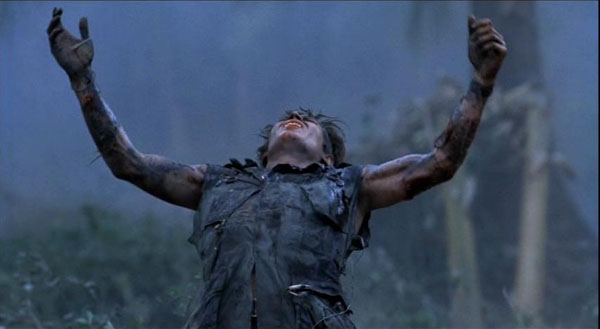
Stone’s original narrative follows Chris, played by Charlie Sheen, and his crazy, charismatic Sgt. Elias, played by Willem Dafoe. Throughout their time together, Sgt. Elias and Sgt. Barnes constantly bat heads, due to Sgt. Elias’s violent and ruthless way toward the Vietnamese. Due to this, drama within the platoon soon reaches an apex that would end in a darkly tragic way, that the other platoon members would actually somewhat justify as right. The film is littered with ultra controversial depictions of war. None greater than American soldiers growing to attack each other as well as the enemy. One of the characters also sarcastically writes “when I die, bury me upside down so the world can kiss my ass,” on his helmet.
The film also has countless sequences in which Stone used unconventional and artistic cinematography techniques to portray the transforming lives of the soldiers. Twisted, savage, and relentless only begin to describe the narrative of Platoon. The film also famously uses “Adagio for Strings” composed by Samuel Barber during the films dramatic climax. A very tragic piece to compliment the depth of chaotic warfare going on in the film.
9. Black Hawk Down (2001)
Ridley Scott’s war biography Black Hawk Down recounts the lives of 123 elite U.S. soldiers who are ambushed by Somali soldiers during the Raid of Mogadishu in 1993. The screenplay was adapted from the book of the same name by Mark Bowden, who wrote a series of articles recounting the events of that day for The Philadelphia Inquirer.
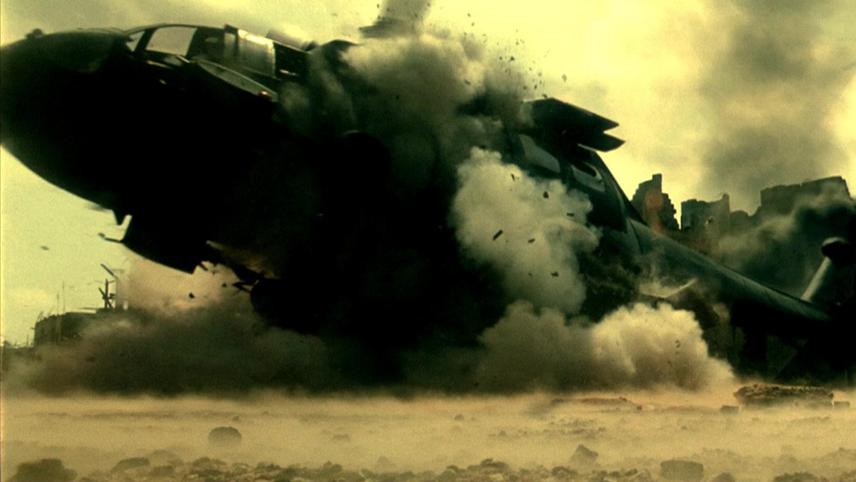
Black Hawk Down is one of the most emotional war stories ever told. The events in Somalia in 1993 made a tragic, and heart-wrenching story of loyalty in the face of complete despair. From the start of their mission things start to go horribly wrong, and things only get worse as the political backlash going on prevents the U.S. and their allies in the area to help their troops in need for some time, stranding them in chaos.
The humanism shown within these characters is inspiring and heart-breaking at the same time. This caused such a pathos within the audience that gave them a true feeling of melancholy. Hans Zimmer wrote the score for the film, creating the memorable track “Leave No Man Behind” that perfectly set the tone of sadness within the loss of so many American lives.
The film won Oscars for Best Editing (Pietro Scalia), and Best Sound Mixing (Michael Minkler, Myron Nettinga, Chris Munro). Ridley Scott (receiving a Best Director nomination) successfully put his stamp on the war genre in an original and powerful way.
8. Saving Private Ryan (1998)
Widely considered by general audiences as the greatest war film ever, it would seem that Saving Private Ryan should be higher up on this list. However, it seemed that Saving Private Ryan was a terrific blockbuster war film, but not one of a truly lasting impact to the genre as some of the others here. Saving Private Ryan was notoriously remembers for its introduction scene of the raid of Omaha Beach on D-Day, in which as soon as American soldier exist their watercraft, they are immediately tore apart by heavy machine gun fire. Spielberg excellently used very high shutter speeds and an enormous amount of special effects to bring the grit, bloody, and shock of war to life. With Tom Hanks and Matt Damon, the casting is unarguably some of the best in war film history.
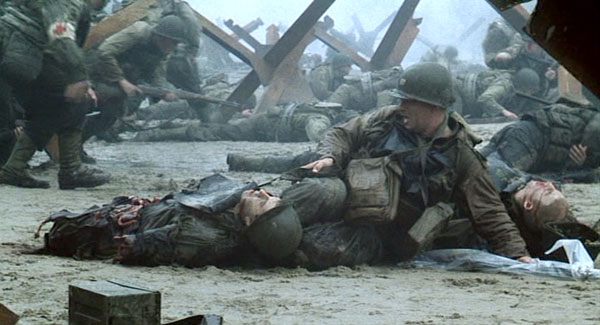
The narrative follows Tom Hanks as he leads his men behind enemy lines to retrieve Private Ryan when all three of his brothers have been killed in combat; it is a journey of loss and a test of faith in the leadership of Hank’s character. There are numerous memorable scenes throughout the film, including everything from lying underwater surrounded by bloody bodies, throwing bombs in socks covered in grease at tanks, and viciously intense personal combat. Steven Spielberg’s collaboration with cinematographer Janusz Kaminski brought all these scenarios to life. This film is not so low on the list for any particular reason, but that it would seem at times a bit melodramatic in parts. It is an astounding war film no doubt, and deserves the recognition it received.
7. Jarhead (2005)
This war film is unlike all others. While its portrayal of soldier trauma rivals The Deer Hunter, the soldiers themselves never see actual combat. Sam Mendes’ war film is also considered by many to be one of the most realistic war films ever made.
The story is a biography written by William Broyles Jr. about his pre-Desert Storm experience in Saudi Arabia. Shot by master cinematographer Roger Deakins, the film is absolutely stunning from start to finish. Jake Gyllenhaal delivers a terrific performance as a soldier who both questions why America is in Sauid Arabia, the ethics of the U.S. Military, what he will do with his life, and if he even cares to live anymore. A memorable scene from the film involves our protagonist bullying another soldier by pointing a loaded gun directly at his face while reciting reasons why he might want to kill him, until he gives the soldier his weapon and puts it in his own mouth, shouting at him to pull the trigger.
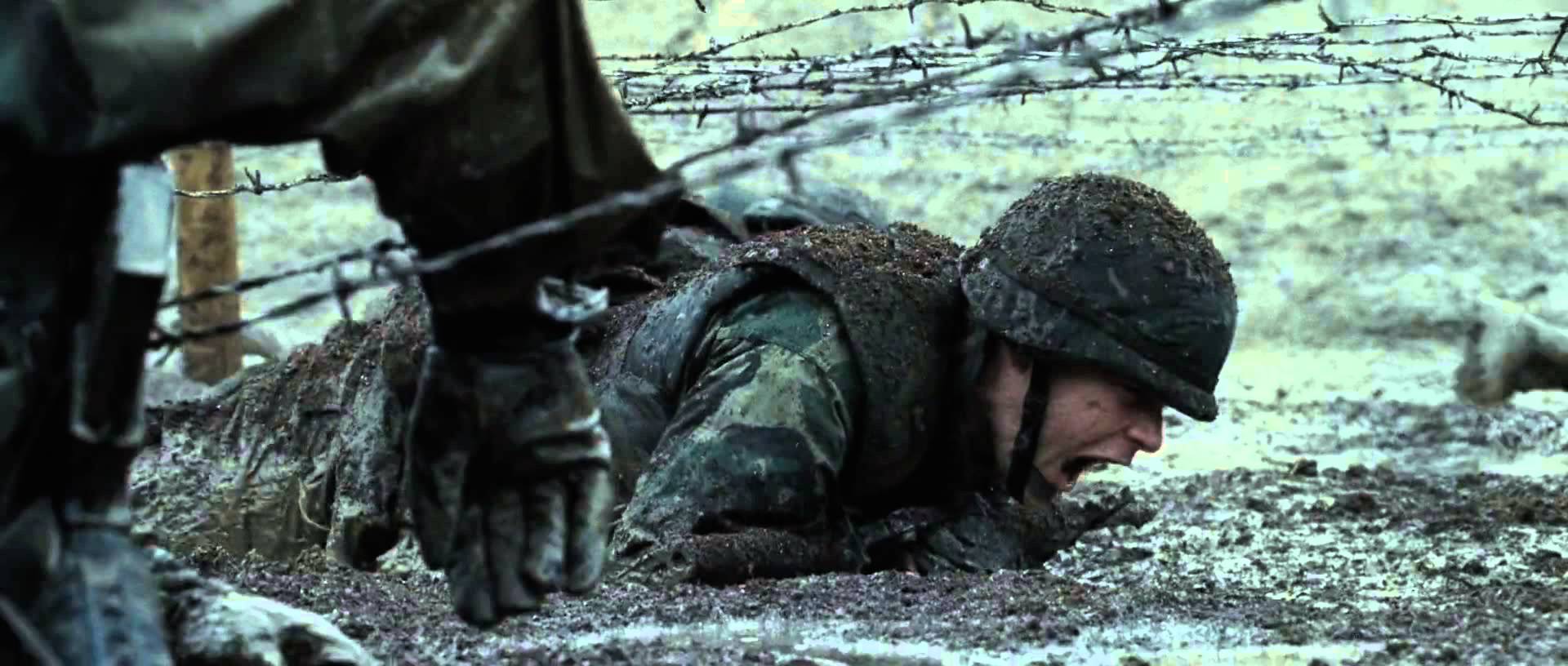
Like The Deer Hunter and The Hurt Locker, Jarhead shows the live of our protagonist as boring and mutated once he gets back home, saying that a soldier “comes home, and he sees that whatever else he might do with his life, build a house, love a woman, change his sons diaper, he will always remain a jarhead.” The film also shows the breakdown of soldiers in Saudi Arabia, despite the fact that they never actually engage any enemies. They suffer from psychological trauma due to the carnage around them, and the anticipation of actually doing something, or just randomly dying.
6. The Hurt Locker (2008)
The Hurt Locker, directed by Katheryn Bigelow and written by Mark Boal, is perhaps one of the greatest war films of the 2000s. Winning Best Motion Picture, Best Achievement in Directed (Katheryn Bigelow), Best Writing, Original Screenplay (Mark Boal), Best Achievement in Film Editing (Bob Murawski, Chris Innis), and Best Achievement in Sound Mixing (Paul N.J. Ottosson, Ray Beckett) at the Academy Awards in 2010. The film forever made a stamp not only in the war genre, but in cinematic history.
The film is almost more a character study than anything, focusing on William James, the “adrenaline junky” who is the new commander of a bomb squad stationed in Iraq. James is a renegade of convention, and often goes into conflict without telling his team members his plan, or without wearing protective gear because he wants to “die comfortable”. His sudden and disruptive presence heavily impacts his two other teammates, one of whom is wrestling with heavy existentialist concerns constantly. This troubled character serves as a profound voice directly to the audience, explaining how quickly his friends die in the war, and how he struggles with his own survival in the face of so much loss. This is one of the main themes presented throughout the film. Since the movie came out during the actual Iraq War, it was very much a commentary on the controversial social and political turmoil going on in the middle east at that time.
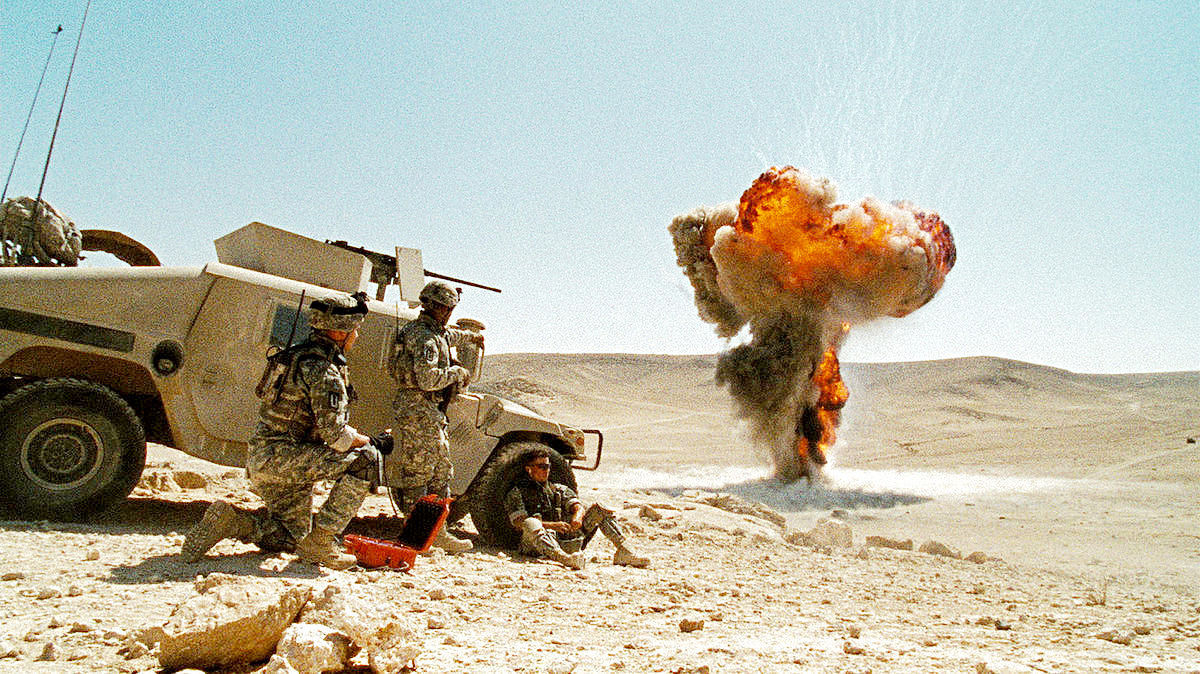
The way the film was shot gave it the feel of being a documentary, while keeping the audience engaged in things happening beyond the eyes of our main characters alone. The sound design and original score was breath-taking, sharp, and rustic, making it a well fitting match for the unflinching ferocity of the environment. Whether seen through a dusty car window, or in the dirty gravel on the streets of Bagdad, the film is never shy about portraying the ghetto of a war-torn country still under siege.
The films opens with Chris Hedges’ quote “The rush of battle is often a potent and lethal addiction, for war is a drug.” This quote culminated to his apex within the character of William James; someone who actually liked war because it was dangerous, and risky, and rode the hairline between life and death. We learn throughout the film how much this affected James’ life back home with his wife and newborn child, and how monotonous he felt that sort of life was. This idea was beautifully illuminated through the scene in which James’ has to pick out cereal at the grocery store, and stands alone, dumbstruck, looking up and down the isle of cereal boxes all conformed perfectly to one another–all so boring. He finally snatches the one directly in front of him and paces away. This is one of the most profound shots in war film history, tackling the idea that some people like war, simply because it’s war; and even if they don’t, regular life will never be the same after a war-like experience.
5. The Deer Hunter (1978)
Another terrific war film about the Vietnam War, The Deer Hunter was truly horrifying upon its release, and still is. The film is known for its brutal depictions of torture (both physical and psychological) of American soldiers, and how the trauma stays with them, like a virus, even after they return home. This theme is beautifully portrayed through the symbolic metamorphosis of these mens’ humanity when they go out hunting together as friends both before, and after their deployment. The metaphor of hunting animals before war, humans during it, then trying to hunt animals again after it, is one of the deepest and most profound allegories of war violence ever put to screen.
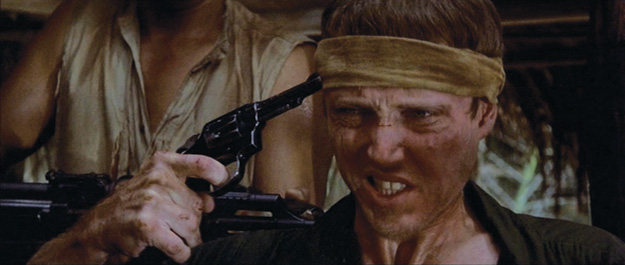
The Deer Hunter harbors perhaps some of the best performances from actors among this list. Robert De Niro and Christopher Walken sublimely portray best friends through trial and tribulation as they fight, and suffer together. This film is unforgettable in story, character, performance, and theme; bringing about some of the most intense scenes in war film history.
4. Apocalypse Now (1979)
Apocalypse Now is perhaps the most grandiose film on this list in scope of execution, caliber, intention, and austere. Winning the Palme d’Or in 1979, it is both a great cinema classic, but also a notable art film from the great Francis Ford Coppola. Coppola also co-wrote the adaptation of Joseph Conrad’s fabled novella “Heart of Darkness” also with John Milius. While the theme and profound dialect from Conrad were kept, most of the plot was changed by Coppola and Ford. The original tale takes place in 1890, along the Congo River in the heart of Africa. However, Coppola and Milius set their film in the heat of the Vietnam War.
Of all the war films on this list set in Vietnam, this film portrays the Earthly desolation of the country perhaps better than any other. Many instances in this movie the viewer finds themselves in awe of the strategic build and destruction regarding production design thanks to Dean Tavoularis, who also worked with Coppola on the Godfather Trilogy.
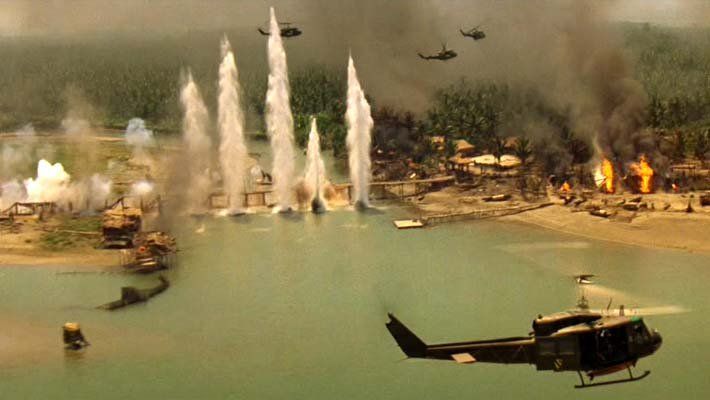
The film was deemed “culturally, historically, and aesthetically significant” by the National Film Registry and Library of Congress. The film is also notorious for being an actual nightmare to make. Rumors have spread about Marlon Brando showing up overweight and not knowing anything about the role, Martin Sheen having a meltdown and heart attack on set, and numerous sets being destroyed by hazardous weather.
The film notoriously uses Richard Wagner’s masterpiece “Ride of the Valkyries” set to a stampede of helicopters flying over the ocean which is considered to be one of the greatest moments in film history. The film also notably opened with The Doors famous hit “The End” set to a massive explosion in heart of the jungle. Coppola can incorporate both classic and unconventional methods of filmmaking into his art and mingle the two in a collage of wonder unlike anyone else; this is present arguably in Apocalypse Now more so than any other Coppola film.
3. Full Metal Jacket (1987)
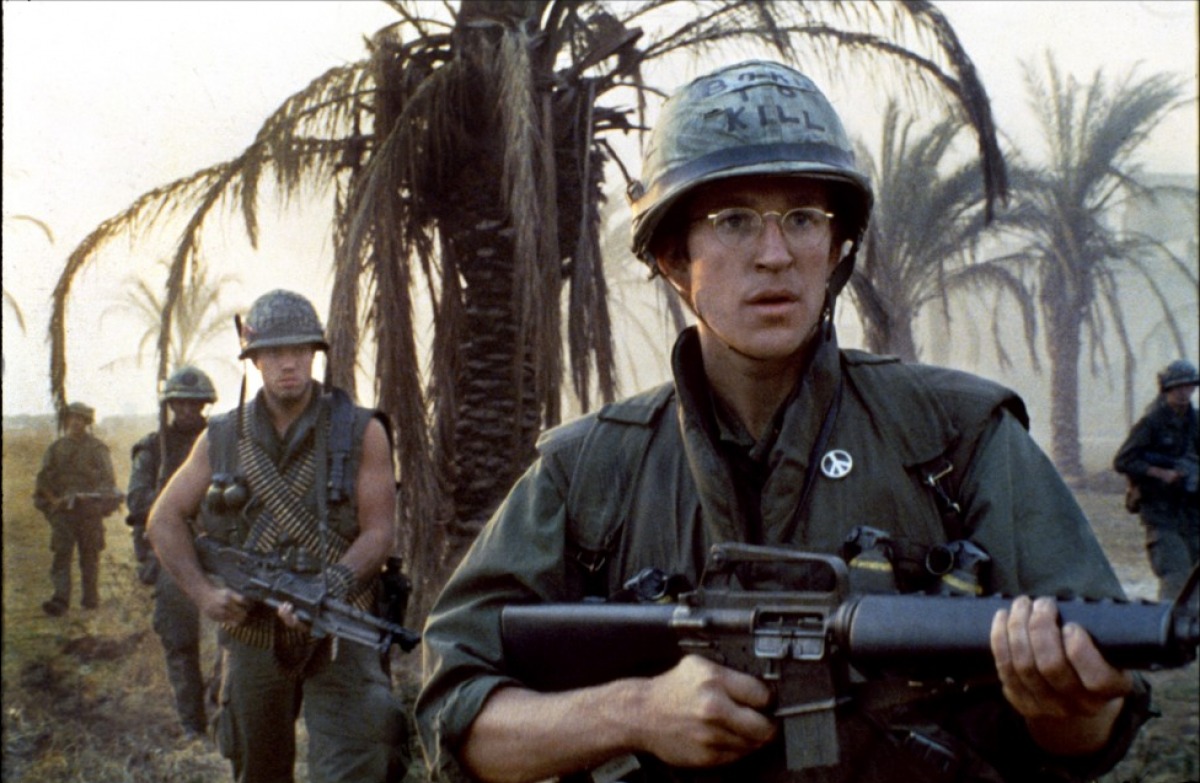
Arguably the most referenced, discussed, and shockingly dark war films of all time is Stanley Kubrick’s war masterpiece Full Metal Jacket. Kubrick was a pioneer of film, and broke all the boundaries of genre in every film he made. So when the master of American cinema made a comprehensive war film about perhaps the most controversial and backwards war of all time, the Vietnam war, it fell nothing short of masterful.
The follows J.T. “Joker” Davis, a soldier during the Vietnam war who would eventually become a reporter for it. From boot camp to the heart of battle, the narrative tracks Joker and the crews he becomes a part of. Joker himself is a dualistic figure within the war who is “born to kill”, but also supports peace and doesn’t understand why American troops were in Vietnam. Through many dehumanizing instances of violence, death, and torture, Joker sees all of humanities capacity for evil, though lacking the full constitution to reign change. He finds solace in the mere fact that he hasn’t been killed yet, and that he is surround by his brothers in this hell on earth (war).
One of the most prominent aspects of the film was the dehumanization of the Americans in order to becomes soldiers or “killing machines” before they could go off to Vietnam, and how some of them are pushed well over the line before they even ship out. Through the story, Kubrick illuminated the sexuality of the characters (like he always does), to dig past their hard exteriors as soldiers and highlight they basic, animalistic idiosyncrasies and desires despite being “in a world of shit”. Like The Hurt Locker, this film’s character known as “Animal Mother” is one who truly loves war and loves killing the Vietnamese. While Joker is put off by this he comes to see that Animal Mother’s persona was adapted by his environment, and he is but a product, or transformation of this senseless brutality around him.
Full Metal Jacket is perhaps the most prominent, in-depth analysis of how American soldiers are “broken down” in order to become warriors for battle. They are hypnotized in many different ways, by their commanding officers and their carefully cultivated environment in boot camp. The films most profound statement regards how, in order to become a great soldier in war, you must lose all your humanity first–become fully broken down of moral constraint–and learn to simply kill all who stand before you in the face of warfare.
2. Beasts of No Nation (2015)
There hasn’t been as original and easily profound statement on humanity and war in recent time as there was in Cary Joji Fukunaga’s directorial feature debut Beasts of No Nation. The story follows Agu, a child living in an unnamed African country who, when his family is killed, joins a mercenary group of soldiers trying to fight back. The film’s narrative and aesthetics are both breathtaking in scope and depth. This is arguably the greatest war film of all time that centers on a child soldier.
The film was shot magnificently by the writer and director himself, which is an astounding achievement from Fukunaga. The location and costumes were absolutely absorbing and authentic, fully smothering the audience in the grit of a impoverished country under a civil war. There were sequences when colors completely changed, making it almost fantasy (as seen through the eyes of a child). This film is ranked as number two on this list for many reasons, largely because it is the most distinctly original and diverse war film here.
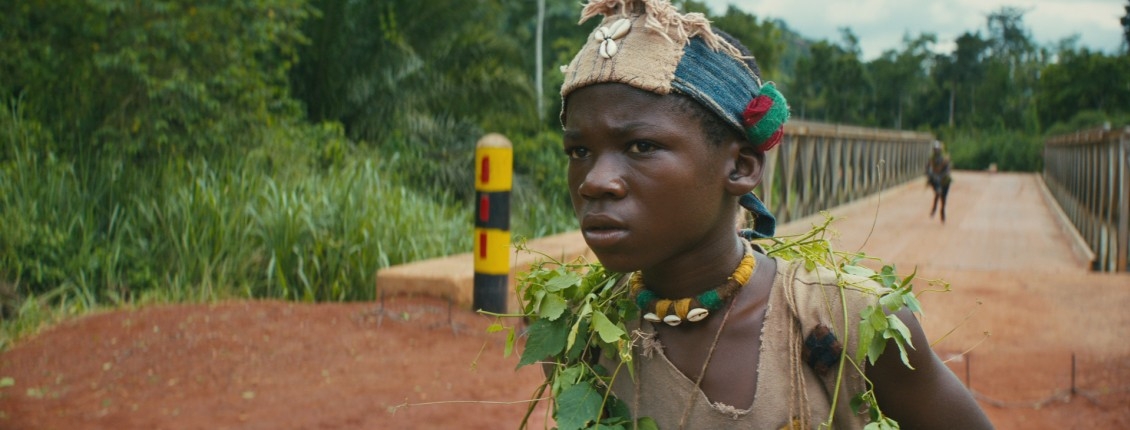
The arch of Agu is developed throughout the film as he conquers fears, confusion of life and death, questions regarding God and existentialism, and the nature of violence. While Agu slowly descends into the darkness of war and despair, he does find a new realization of brotherhood and humility in the mix. These would all be confused for him however, when Commandant starts to take advantage of his fatherly role toward the child soldiers.
With a transcendent score from Dan Romer, the viewer is completely entranced in the humanity, chaos, and camaraderie of the group. The friendships and status of the group members change and grow throughout, showing a basic humanity underneath the veil of adulthood forced upon the young men. This film was a crowning achievement and pinnacle of the war genre, while successfully breaking its boundaries.
1. The Thin Red Line (1998)
The Thin Red Line is by far the most poetic war film on this list. The director, Terrence Malick, adapted the screenplay from James Jones’ autobiographical novel of the same name, in which he recounts his memories and experiences in the Guadalcanal during the Pacific Theater of World War 2. The film starts off in a very humanistic way, with our protagonist staying with a tribe of Melanesian natives in the South Pacific after going awol. He is however captured, imprisoned, and eventually sent back with a battalion to the Guadalcanal.
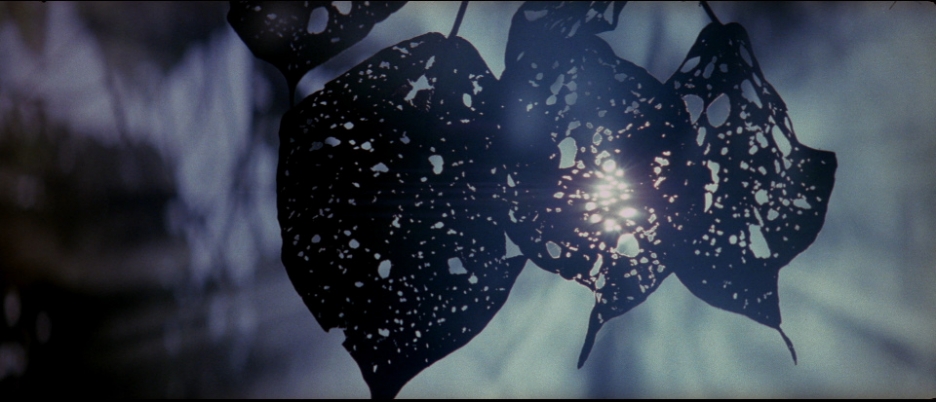
Like all of Malick’s work, The Thin Red Line is many things, poetic, beautiful, profound, philosophical, humanistic, sincere, and grand in all respects. This film brought Malick out of his 20 year absence from filmmaking with a bang, as it was added to the Criterion Collection and, with time, considered one of the greatest war films ever. Along with Malick’s other films, he contrasts the social turmoil of the characters with the awe-inspiring beauty and candescence of the world around them; and this is perhaps no greater than in The Thin Red Line. While the nearly three hour odyssey is full of stunning locations, colors, and jaw-dropping direction by Malick, it is contrasted by the senseless and cruel violence happening constantly.
Watching the film, you instantly notice the editing during the battle sequences. Malick has always closely collaborated with his editor(s) because his editing style is essential to the aura and pacing of his style. The battle sequences would be intercut with closeups of bayonets jabbing, guns firing, and bodies falling. It initially feels like a very very old movie, in which the editing is not very clean and concise, but this was a particular choice by Malick. Malick’s intention was to show the brutality and utter malice of war.
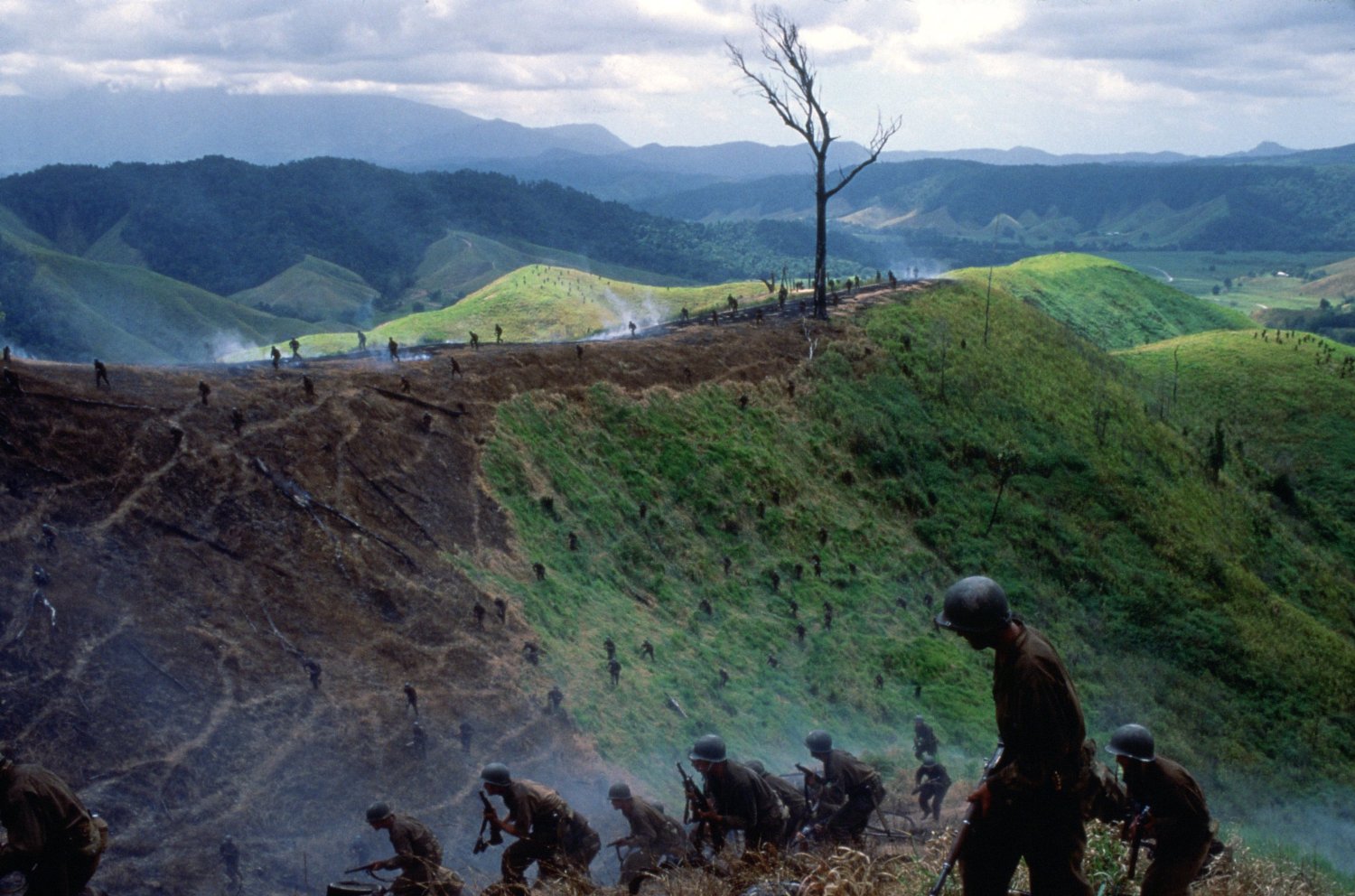
Throughout the film, the characters narrate through voice over their inner thoughts and convictions of the war around them. Most notable, one private recites this during a raid on a village: “This great evil, where’s it come from? How’d it steal into the world? What seed, what root did it grow from? Who’s doing this? Who’s killing us, robing us of life and light, mocking us with the sight of what we might’ve known? Does our ruin benefit the earth, does it help the grass to grow, the sun to shine? Is this darkness in you too? Have you passed through this night?”
Around this time, one of the protagonists’ mind often drifts to his wife living back home, longing for his return. This portrays the elegance of not only romance, but longing and love within these soldiers being transformed in this seemingly foreign world around them; a world of hate and crime, and wrong doing.
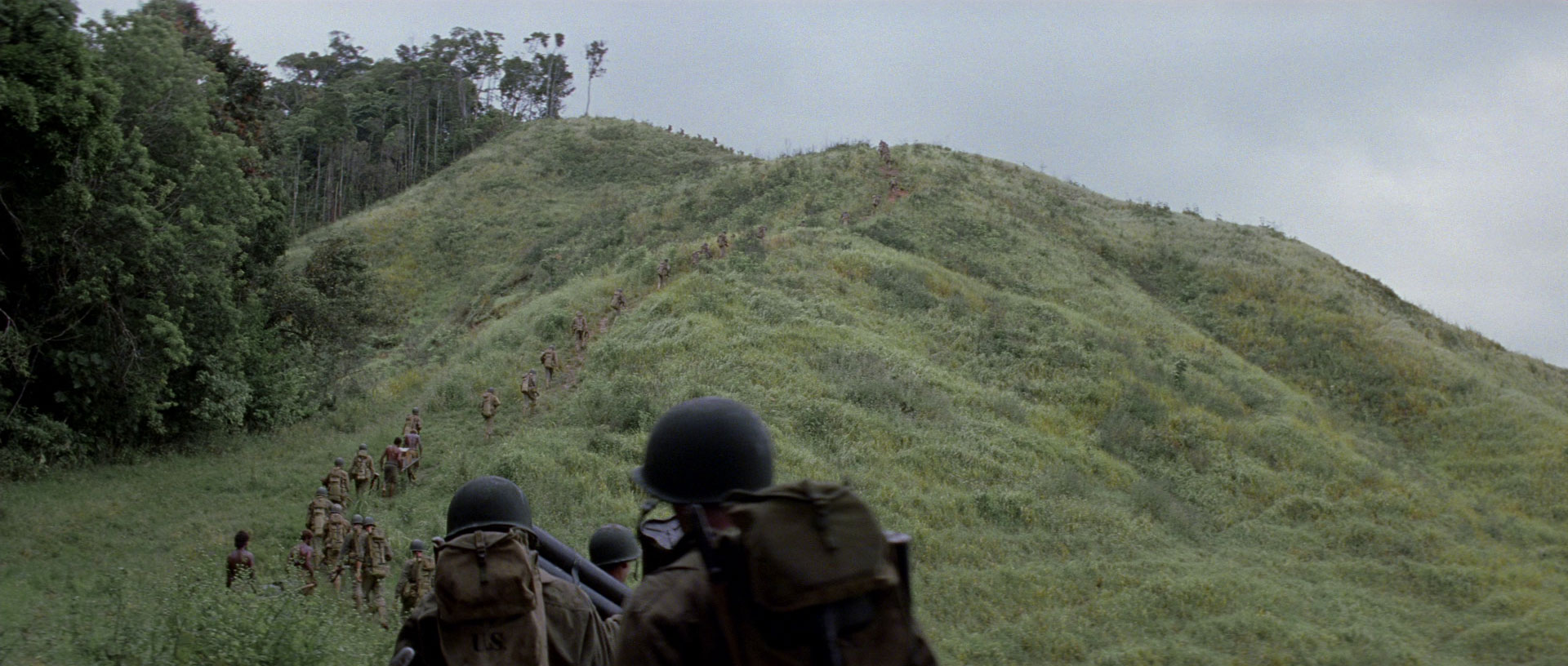
The film was blanketed with a groundbreaking score from legendary composer Hans Zimmer. Zimmer is regarded as one of the greatest film composers of all time, approaching the art with a minimalist style, with a maximum production sense. His profoundly epic and moving music fits in perfectly with a narrative of this scope and conveys the emotional backlash with it. The tracks “Journey to the Line” and “God Yu Tekem Laef Blong Mi” are the most memorable and legendary pieces of music feature in the film that have (since The Thin Red Line) been used over and over in movies of all sorts.
The film was nominated for seven Oscars including Best Picture, Best Director (Terrence Malick), Best Adapted Screenplay (Terrence Malick), Best Cinematography (John Toll), Best Sound Design (Andy Nelson, Anna Behlmer, Paul Brincat), Best Editing (Billy Weber, Leslie Jones, Sear Klein), and Best Original Score (Hans Zimmer). This film stands above all other war films in the sense of heart, character, intention, and profound impact upon the viewer. This is not only one of the greatest war films and one Malick’s best, but one of the greatest films of all time, worthy of viewing and discussion in equal parts.
There are many great war films in history. There are many terrific ones such as The Bridge of The River Kwai, Fury, and Paths of Glory, which weren’t mentioned in this article but are also noteworthy.
The Thin Red Line was considered the greatest war film ever here because it is in equal parts a meditation on the essence of war, and a pinnacle of voyeurism in cinema. Terrence Malick is one of the most philosophical filmmakers of all time, and through James Jones biography, successfully paralleled mankind’s evil with its humanity, perhaps saying that we are blind toward the two. This should be the ultimate goal of any war film.
“Only the dead have seen the end of war.” -Plato
What do you think? Leave a comment.











A very well made list. I never really thought about what are personally my favorites when it comes to war films, considering there are so many. Apocalypse Now is a powerful film, and The Deer Hunter is very memorable in my eyes. I also really like the war films that focus more on the harmless citizens caught between the war like Schindler’s List, Life is Beautiful, and Grave of the Fireflies.
I used to think Saving P Ryan was realistic, but since watching several documentaries on the war in Iraq and Afghanistan I’ve come to see it has highly stylised nonsense. Even if you check out those documentaries on WW2 that are always on DAVE, you see blokes ambling up the Normandy beaches, bullets all round them – just nothing like the film.
There should be room for something from Sam Fuller on the list. The Steel Helmet or The Big Red One would be the obvious choices, though I really rate Verboten! and Merrill’s Marauders as well.
Schindler’s List is the ultimate war film.
That’s more of a historical drama. There are plenty of historical films that use war as the backdrop and primarily focus on civilians, certainly enough to fill up an entirely different list.
– Steven Soderbergh’s ‘Che’ (both parts put together as one.)
– ‘The Battle of Algiers’
– ‘Army of Shadows’/’L’armée des ombres’
– The Sorrow and the Pity
– Das Boot
– Land and Freedom
– ‘Rebellion’/’L’Ordre et la Morale’
– M*A*S*H
– Welcome to Sarajevo
– Starship Troopers
The Battle of Algiers is the best.
This is an amazing and well written article! You discuss some really great points about the films and their underlying themes. I’m not a huge fan of war genre movies, but your article made me reconsider them in a different light. Very enjoyable; nice work!
I highly recommend The Thin Red Line, its a masterpiece.
Excellent article. You explained each movie well. I’ve actually been meaning to watch Beasts of No Nation on Netflix.
It was one of the best films of the year!
Great article, but I really don’t think the title needs both ‘all time’ and ‘so far’. They do each other’s job.
Well ‘of all time’ was to explain that it would be covering war films from the dawn of war films until now, and ‘so far’ to make note that there are bound to be terrific war films still to come. To leave it without ‘so far’ would be to say that they are all better than any war films that have yet to come out.
I think, when people read ‘of all time’, they can infer that the article is only sufficient up to its publication date. The ‘so far’ might absolutely clarify that, but it also implies that the writer didn’t think the reader was competent enough to work that out for themselves. All publications I’ve read (so far) with lists like these leave it out.
The note that there are great war films yet to come has nothing to do with the article, which is reviewing war films that have already come out. This is emphasised by the opening line of the article being able to stand without ‘so far’, as the title also ought to. Any positive effect of the addition in parentheses is forgotten due to irrelevancy.
This list is pretty good, if somewhat predictable, but it could have used some serious editing. Riddled with typos and nonsensical grammar, it was a challenge to get through without grinding my teeth down to nothing.
By Rotten Tomatoes ratings:
10. 88
9. 76
8. 92
7. 61
6. 98
5. 93
4. 97
3. 95
2. 91
1. 79
Interesting.
No “Patton”?? This list is a joke. Full Metal Jacket does not belong.
Patton is not explicitly about the lives of soldiers in war, while we SEE soldiers and some warfare, the story centers around the General and his point of view.
Unless I’m mistaken, Patton wasn’t a civilian. Just saying
…but what about We Were Soldiers
I guess you mean modern warfare as you did not bring up Gettysburg or Braveheart.
No it implied all war. I just didn’t feel as though Gettysburg or Braveheart were quality enough to make the list.
Braveheart is not quality enough to make the list?
The band of brothers is a great film
Band of Brothers is a TV Mini-series.
I was surprised that the list ended with two films I’d never even heard of! I’ve gotta go check them out, especially if you say that they’re better than Full Metal Jacket. It was just such a horrific movie that I thought really displayed how awful humanity can be.
Get rid of Hurt Locker and Jarhead….add We Were Soldiers and American Sniper or Lone Survivor.
Like I said in the article, the war films chosen where selected with a specific criterion: that they center around soldiers in actual warfare. American Sniper was more about Chris Kyle’s personal life (in and OUT of war) than it was about the Iraq war explicitly. Lone Survivor was very much about soldiers in battle, but I would argue that it’s simply not a quality war film. It tries to be a commentary on the ambiguity of morality in war, but it really just showcases jingoism.
Come and See is amazing film! Well, I say amazing… leaves you with a feeling of dread… certainly captures an element of terror absent from some war films, showing the horrors faced by every man, woman and child.
But Apocalypse Now isn’t really a war movie is it?
I mean it’s a movie set in a war, and has possibly one of the most stiring, thrilling 5 minute battle sequences ever made (in Robert Duvall’s Wagnerian ‘I love the smell of napalm’ moment,) – but apart from that, there’s virtually no action, and the whole film is an extended psychological portrait of one man’s (well, maybe two men’s) descent into primal darkness. The war provides a backdrop, of course – but the movie isn’t centrally concerned with the war.
I’m sure some people will disagree, but for me, whilst it is in many respects a great film, it’s not a war film per se, so seems an odd choice to top a list of ‘the best war movie ever…’
For me: The Longest Day, Schindler’s List, Zulu, The War Lord, Assembly, Kingdom of Heaven (Directors Cut), The Last Valley, Waterloo, The Battle of The Bulge, the Guns of Navarone.
I would call Apocalypse Now a war film. It definitely displays a voyeur for war, like all war films should, and the narrative centers around not only darkness of mankind, but specifically the controversial evil that was the Vietnam War. The book it was based on takes place during the British imperialization of the Congo, Coppola and Milius specifically wrote the adaptation for the Vietnam War, applying Joseph Conrad’s insights in a more prevalent allegorical tale. I think all these constitute a war film.
Jacob’s Ladder!
A couple of foreign language films that could have made this list would be Talvisota or Das Boot.
I’m so happy The Thin Red Line is at the top, that movie is majestic. Even more so considering it is often overshadowed by Spielbergs lesser war film of the same year…. Also Apocalypse Now is amazing, not sure whether i like the Redux more or less?
Redux was an abomination; the only good thing about it was that it helped you realise just how good the editing of the original was. The gradual descent towards the ineluctable darkness was replaced with a clunky episodic feel, there was no need for Mo Green and Willard worked best when he was more ambiguous (ie not smiling); the scene where they stole the surf board was cringy, although Kilgore’s it was a good board… and I like it, you know how hard it is to find a board you like… bit was funny.
Paths of Glory should be number 1. That’s how to end a movie. And its running time isn’t ridiculous.
I found Full Metal Jacket to be profoundly interesting during the first act in the boot camp, masterfully insightful into human nature and the nature of war as “Gomer Pyle’s” spirit is broken in basic training. However, the second act of the movie, in which the men actually dare to venture into the war itself, seemed amorphous, distracted, and somewhat cheesy. It could essentially be equivalent to watching two separate movies were it not for the running times and the connection of Joker and the thousand-yard stare.
The second half did support the “born to kill/peace” duality, and showed how the sexuality of men was still present in Vietman despite them having been ‘broken down’, that what the ending symbolized with:”why thoughts drift back to erect-nipple wet dreams…I am in a world of shit, but I am alive.”
Fury and Patton should have made the list!
OK, I honestly, genuinely, sincerely believe that this list actually needs more End of Evangelion. The military elements of that film are intense. AND AWESOME.
Cross of Iron.
Went the day well.
All Quiet on the Western Front.
Downfall.
The Victors.
The Young Lions.
The Hill.
The Blue Max.
Aces High.
Battleground.
I thought Waltz with Bashir was pretty great war movie.
How about “Enemy at the Gates”? The depiction of the plight of Russian soldiers attempting (being forced at gunpoint) to hold against the Germans at Stalingrad alone is enough to warrant a watch.
Of course people (like me) will quibble with your list and analysis. No “American Sniper.” No “Lone Survivor.” No “Fury.” On another internet list of 100 best war films the #1 was “Come and See” (Russian). That is one you should definitely check out–already mentioned. “Gallipoli” anybody? Andrezj Wadja, “Kanal”? Anyway, good list to generate discussion.
When Trumpets Fade is my pick of war films that portray the horror of war. It was overshadowed by SPR which is a shame because it meant the horrific churn of men and machines that was the Battle of Hurtgen Forest still has no real profile.
One film that I believe should be on the list and is missing is We were Soldiers. A great film in my opinion, based on a true story and shows the effects of war on the home front as well.
My Top 10 would be:
Platoon
Das Boot
Braveheart
300
Last Samurai
Full Metal Jacket
The Great Escape
The Warlords
Zulu
Alexander (Got to mention his name at least)
Das Boot, is better than any of the films on this list I have seen.
Apocalypse Now is the most indulgent, overrated piece of crap imaginable. For a film about Vietnam you’re much better off with Platoon or the underrated Casualties of War.
Best films about war? Noel Coward’s In Which We Serve or Powell and Pressburger’s Life and Death of Colonel Blimp.
And Iron Cross should be on there too.
Apocalypse Now is absolutely extraordinary, one of the most dazzling films I’ve ever seen (and I’ve seen a lot of films). There are moments in it of such brilliance that most other major films are beige in comparison.
Saving Private Ryan? Surely the best war film of all time!
Not sure about that. 20 visceral opening minutes followed by an overlong, sentimental and rather pedestrian by the numbers war flick
Here’s a few more:
Westfront 1918
The Red And The White
Fires On The Plain
Ivan’s Childhood
Father Of A Soldier
The Human Condition Trilogy
Kanal
The Burmese Harp
Objective, Burma!
The Big Parade
Also, am I the only one who remembers that Black Hawk Down is a zombie movie?
Oh, and since you mentioned Platoon. There’s also 84C MoPic which came out in 1989 and is beloved by many above Platoon. Might have been worth mentioning.
In fact, I remember a veteran leaving a comment on my negative review of the film saying how much he liked it and how it captured the experience he had during war.
It is worth noting that Beasts of No Nation is not Fukunaga’s feature directorial debut. He previously directed 2009’s Sin Nombre and 2011’s Jane Eyre.
Life is Beautiful?
I love this film, but I think it probably does not belong here. Partly because I can think of ten better war films
… such as Casablanca.
This is a great summary of the movie plots and their contents. Perhaps a great list for war genre movie fans. I wondering if the writer have considered to explore how the themes (not only the representation of the brutality) in the film contributed to their success. For example, in many ways these films deal with controversial social and political issues of their time. You hinted a bit on this in discussing Platoon. Two films that I like as great war films are the Flags of Our Fathers (2006) and Letters From Iwo Jima (2006), both co-produced, by Clint Eastwood. The fact that the movies, present the two different side of the same battle is intriguing. I feel in many ways the films gives as a glimpse of how individual soldiers, in both sides, deal with similar issues in respect to loyalty, bravery, patriotism.
I pooped my pants
This list misses some tings.Best war movie ever is actually not any of this. It’s actually another movie. Called *M*A*S(H* It you haven’t seen it educate yourself cuz you’re not cool with this diarrhea shit also watch 300 rose of an empire
Agniezka Holland’s disturbing and brilliant Europa, Europa / Hitlerjunge Salomon would have added a little female balance to this list, as well as a fascinating take on the “tribal” aspect of war’s protagonists.
Was the list written before “Downfall”, the German film? That’s my favourite war film, although I guess it’s not about soldiers in the same way as the other films.
I shit movies better than TM.
luminousgloom,
This is a pretty solid list, and it certainly reflects the kind of war movies that I used to enjoy, but in time, I’ve come to appreciate films that don’t rely on the poetic interpretation of war but rather as genuine a representation of it as possible.
For example, I used to appreciate The Thin Red Line and Apocalypse Now for their depiction of the spiritually corrosive nature of war, but the fact of the matter is that neither Terrence Malick nor Francis Ford Coppola served in the military and neither one truly knows what combat is like or spoke to veterans in order to tell their stories. They just showed war through their eyes, which to my mind, are desperately wanting in terms of actual experience (to Malick’s credit, he did base his film on the autobiography of a veteran; Coppola, on the other hand, opted to take a nosedive into the hubris pool when he claimed that his movie didn’t show Vietnam, it WAS Vietnam).
Conversely, other movies/programs like We Were Soldiers, Band of Brothers, Generation Kill, Lone Survivor, and American Sniper were made with the permission and, sometimes, the direct participation of the veterans who served in each war (Vietnam, World War II, and the Afghanistan/Iraq Wars respectively). This lends an air of credence to each one that can’t be found in The Thin Red Line or Apocalypse Now and, to my mind, that makes them the better movies.
While I diverge from your list substantially on the grounds that I’ve come to appreciate different elements in war movies than you do, you certainly did a good job of presenting your admiration for the war movies you listed.
-August
Well-written and great pics. I definitely will watch BNN.
Watched and was incredibly moved. The child actor, Abraham Attah, is amazingly talented.
the original ” all quiet on the western front” ” the blue max” ” Sgt York ” ” pearl harbor ” ” blood diamonds ” ” the flying tigers ” ” Gunga Din ” “flyboys” ” Kelly’s Heroes” ” they died with their boots on”
also Errol Flynn ,Olivia De Havilland made some great movies…check out Charlie Chaplin” the great dictator ” for satire. “.the great escape.” . ” the eagle has landed ..” “Stalag 17” …
Its a good list of American war movies, but missing some good from other countries 🙂
I don’t have a problem with your list, as it is your opinion, but I do agree with several people that this is more or less a list of American war movies.
I would have most likely included foreign films. I am a strong advocate of “Grave of the Fireflies.” It is a beautifully animated movie about siblings trying to navigate their way through a devastated Japan after an American bombing during WWII.
It’s well worth a watch.
Aside from Beasts of No Nation, the list is extremely American in nature. Then again, Hollywood bank rolls stories for American consumption. No Waterloo? No Zulu? Would not Lawrence of Arabia qualify as a classic war epic?
Also Dunkirk was a great film and so was war horse